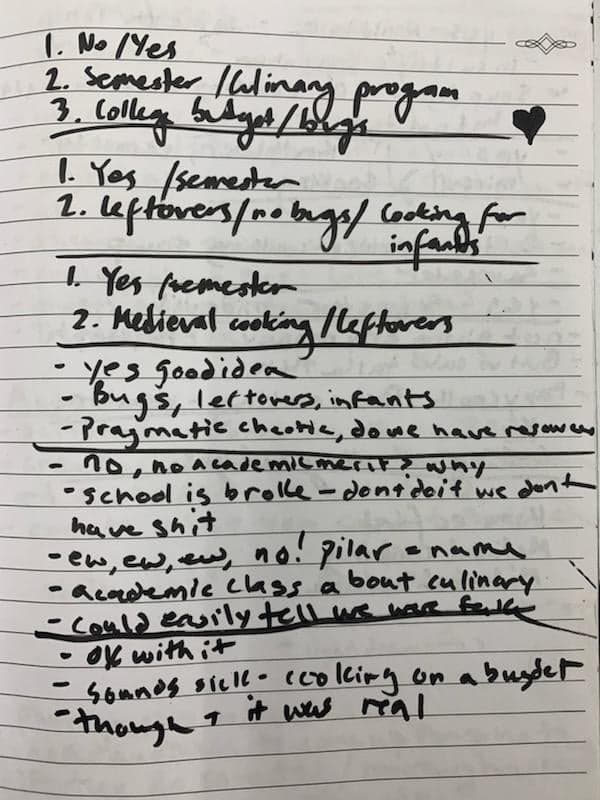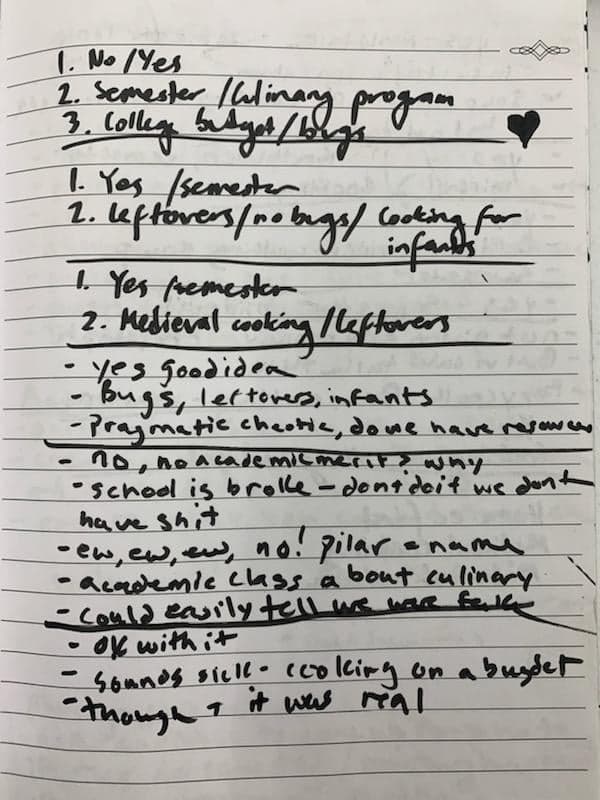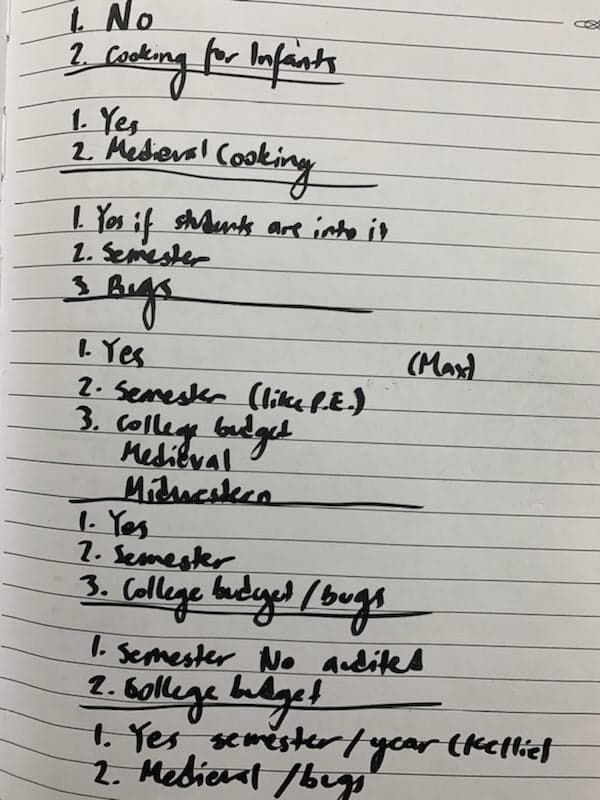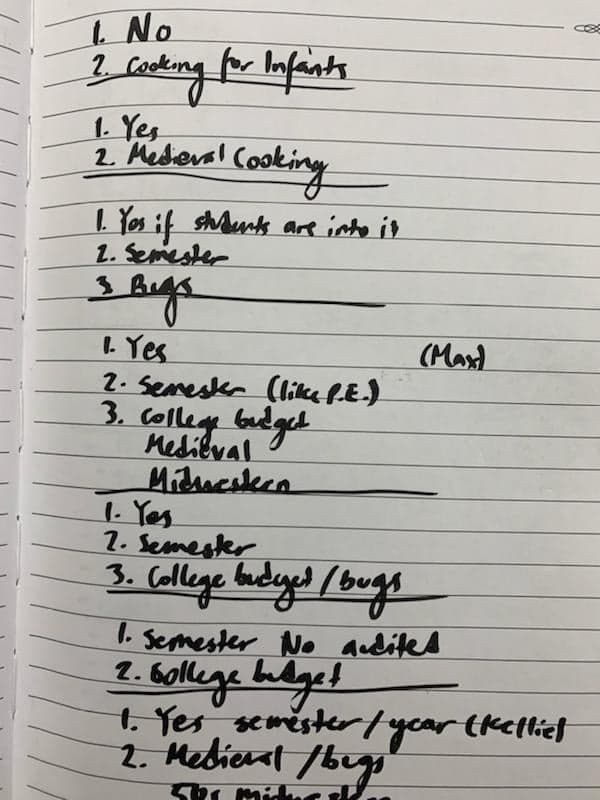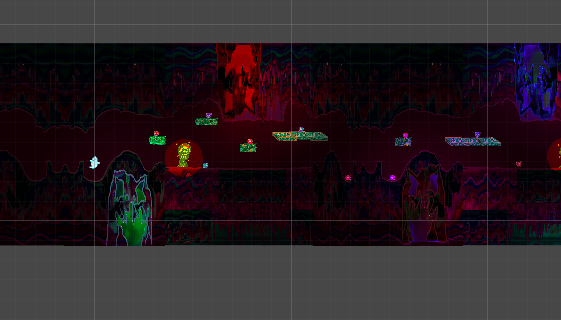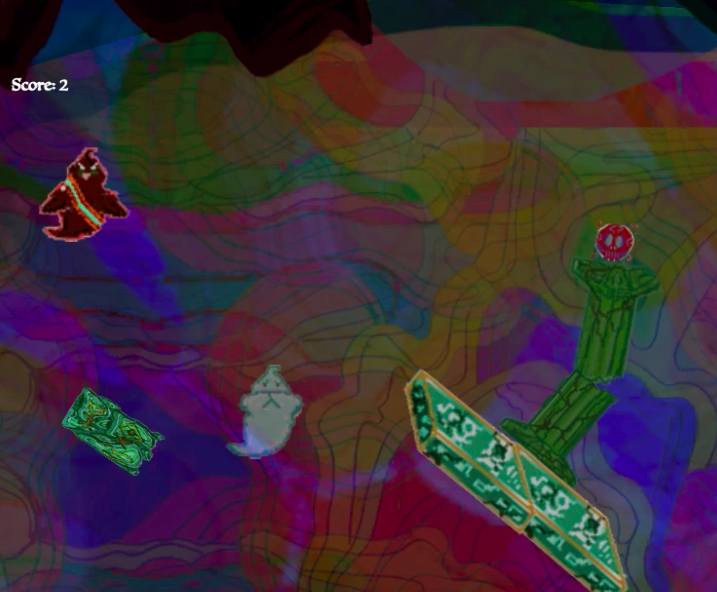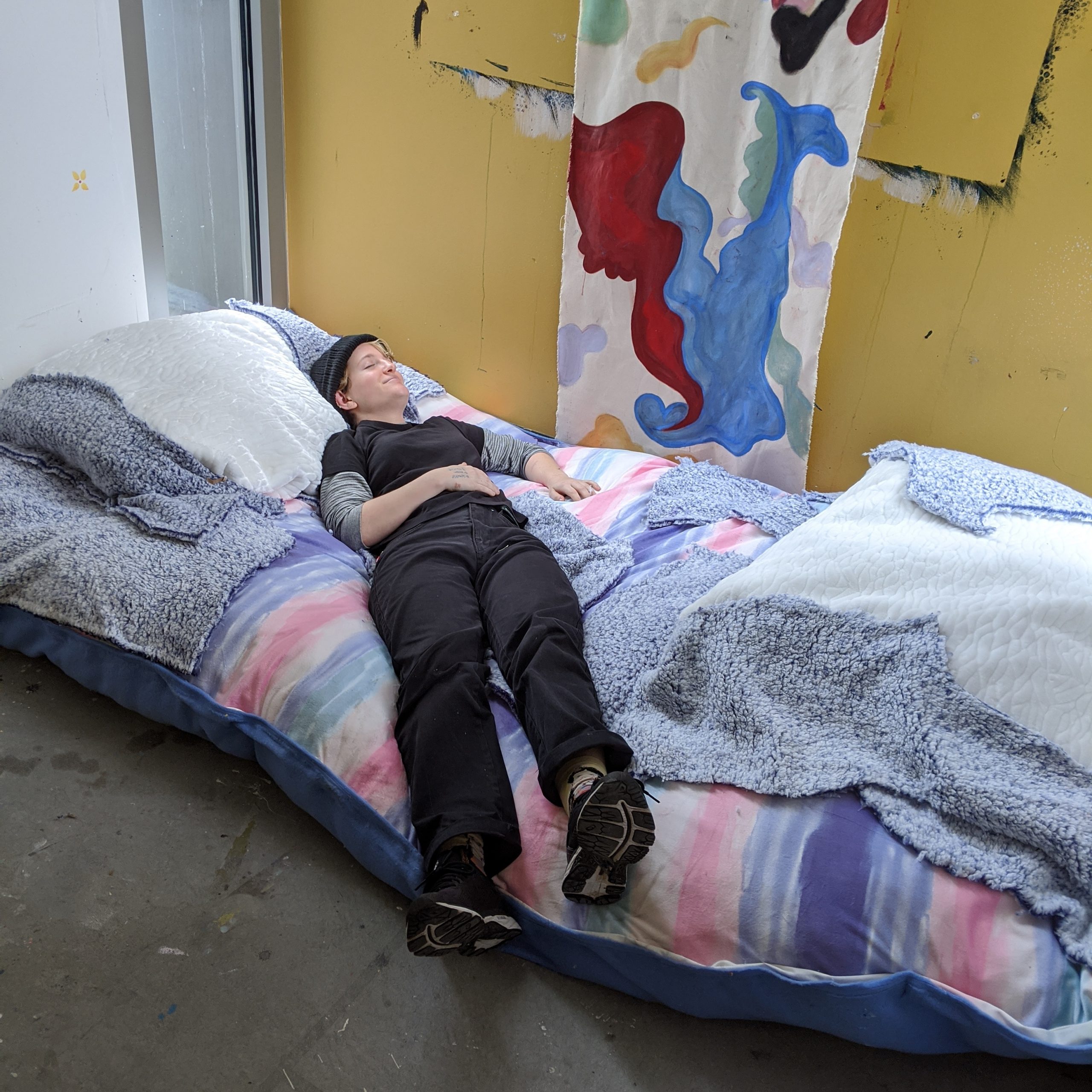By Isiah Taylor, Peck Trachsel, Allex Valauri
When planning for this hijack, our group went over multiple topics concerning academic and residential life at Sarah Lawrence. While coming up with a brief series of questions concerning potential topics, our class had to think about how our reenactment would be perceived as ‘credible’ by individuals who both observed and interacted with our group and the other members of our class who would be located nearby. We decided, as a class, to brand ourselves as student ambassadors. My group would be ‘student ambassadors’ promoting a ‘10 year plan’ to add or change the curriculum or student life at Sarah Lawrence.
Some of the ideas concerned curriculum like additional electives for P.E. while others considered rooming situations like ‘are you astrologically compatible with your roommate?’. We came to the conclusion that the SLC student body would take intrigue in the addition of “culinary classes” that would function as open seminars. We then began to think of different mock classes that we would use for our survey. Due to seamless collaboration, ideas came with ease. They ranged from ‘Medieval Cooking’ to ‘Cooking with Babies’ which we would jokingly explain was making different variations of baby food each class. We wanted our options to be somewhat believable while still maintaining a level of absurdity. We choose to put six different classes as “potential options” in our survey. We then continued to discuss what questions to ask, and how to handle skeptics or further questions about the ‘plan’. We decided to ask 3 basic questions concerning these mock classes, 1. How do you feel about culinary classes being introduced to the curriculum, 2? Which one would you take? 3. If you were to take the class, would you want to take it for a semester or a year? We would also have answers ready if someone were to ask where these classes would be hosted, would there be any supplementary work, and how one would be graded on a culinary assignment/conference.
The idea of a physical hijack at first made me very nervous. I did not know if it was to be done solo, which would have been much more difficult. As we watched that Australian show with hijacks quite similar to our own I imagined having to engage the participant alone and contemplated how difficult that would be for me especially. However, as a group our Hijack shined. I believe that if not for the group environment our hijack would not have functioned as well as it had, especially since all groups were in close proximity to one another. All of the hijack groups were stationed in front of the Barbra Walter’s Center. At the beginning of our hijack, there were not many people present to answer our survey, but eventually, our group had many people walking past us that we were able to ask, as well as some students who voluntarily walked up to us and asked what we were doing.
Our group survey, compiled within an hour-and-a-half time period during the late morning/early afternoon in front of the Barbara Walters Campus Center, yielded over twenty responses from a pool of around thirty potential interviewees.
We polled almost exclusively students—with the exception of one professor—receiving results most readily during the latter half of our excursion (after 11:30 am when many of the first block of classes end and a large concentration of students migrates from the lower or upper halves of campus to get lunch). As we warmed up to the process of gathering information from passers-by, we adjusted our approach: we learned to reach out to people who were not walking rapidly, avoiding eye contact or looking at their phones, as all of these actions suggested an unwillingness to participate in a survey. Allex also came up with the technique of reassuring a potential interviewee that there were “only a few questions” that would “take just a few minutes.” About two-thirds of the time, at least one of the three of us encountered people that we knew personally, which widened the pool of interviewees, as we were more comfortable approaching our friends and our friends were more likely to engage us in conversation.
During the physical hijack, Our group split into certain jobs. One would take notes while the others engaged the participant. Setting up this system allowed for an even amount of attention placed on the participant while still allotting one of us a break to take down data. Allex handled a lot of the speaking, and I would ask to follow up questions while Peck took quite detailed notes. For the most part, this system worked very well as Allex was quite engaging. He would perfectly pull the participant in and speak very seriously about the contents of our Hijack, even pulling participants back in even after the screaming room group had their outbursts. The ability to keep seriousness I think is what made participants think this was all legitimate in the first place. Also by seeing someone take detailed notes as we spoke reaffirmed that seriousness as if this data was actually going to the board of Sarah Lawrence College.
Most of our subjects responded positively to the survey as a whole and seemed eager to offer an opinion on Sarah Lawrence’s ten-year-plan, which speaks to the SLC student body’s general propensity to want to stay informed about campus life and curriculum changes. The majority of students interviewed also responded positively to the content of the survey, apart from three to four outliers who said they (a) would not take a culinary course because they were not interested themselves but were not specifically opposed to the idea, or (b) would not take a culinary course and were against the idea of Sarah Lawrence adopting such classes into the curriculum because of concerns about budget and space.
The titles and descriptions of potential culinary courses that provoked the most conversation (in no particular order) were Medieval Cooking, Leftovers: Cooking on a College Budget, and Just Bugs. Medieval Cooking received the greatest concentration of positive responses, perhaps because many people associated the title with renaissance faire-style, fantasy-esque cuisine, or were interested in a possible historical component. 1950s-style Midwestern Cuisine produced the most polarized response, as almost half of the subjects who mentioned the class were aware of some of the unusual ingredients that went into Great Depression-era cooking and responded negatively, but half were evidently not aware of this, and were drawn in by the humorously specific title (as was also true with Just Bugs). Interestingly, despite being the last item on the list and therefore (we thought) the most memorable, very few participants said they would take or even mentioned Soup du Jour as it provoked the most confusion.
After our experience interacting with students and faculty alike during this hijack, our group was pleasantly surprised at the number of participants who were willing to take the time out of their schedules to answer our questions and entertain the notion of culinary courses. The survey enabled a plethora of opinions concerning the addition of these courses. Some participants seemed eager and enthusiastic about the idea of saying they would find this class to be a fun course to take. Most people were confused by the survey even asking if the survey was real, or simply expressing doubt about the credibility of the ‘10 year plan’. There was a small group of people who expressed frustration towards the survey, and more directly the college, on the basis that the school’s finances should be put towards resources and necessities that the SLC student body needs. It felt satisfying to actually listen to what SLC students felt about the current and future state of the school because as students ourselves we could relate to some of the comments and criticisms made.
In all, I would say our hijack was successful as nearly half of our participant pool at first at least believe this experiment to be a reality. I was guessing that most would see through our farse; however, many took the survey seriously and seemingly trusted us as ambassadors. It not only is a hijack on the school’s ability to improve but also upon the students themselves. Making them think that there is a possibility for change in the coming years. Our data also parsed out frustrations of students who noted that we do not have money to make these changes, or that these funds should be spent on scholarships instead. Therefore, our hijack most likely did confuse some folks but also provided a space for others to vent about their concerns for the campus’s future.
